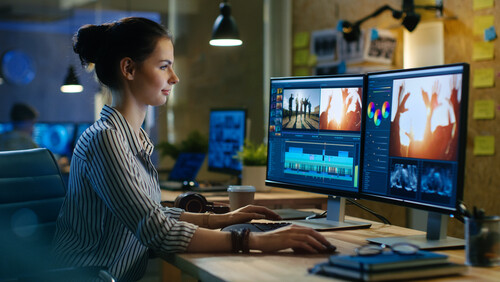Video is one of the many technologies that is being shaped by new developments in artificial intelligence. Some of the changes artificial intelligence has brought are spooky, to say the least. However, the vast majority of the changes are going to have wonderful implications for video technologists and society as a whole.
Overall, we are excited about the implications of artificial intelligence for video. Adobe recently made some impressive advances. Here is an overview of some of the changes on the horizon.
Artificial intelligence brings previously unavailable features to video editors
Video editing used to be a very painstaking process. On average, it would take 4 to 5 hours to edit a single minute of video footage. This was an overwhelming process for video editors working on major documentaries. I recently watched a documentary video that was three hours long. Assuming that the editors didn?t encounter any unexpected snags, it would have taken them about 720 hours to fully edit the footage. Assuming the editors worked a standard 40-hour work week, it would have taken about three and a half months to finish the process.
This is one of the areas where artificial intelligence can be most beneficial. AI algorithms can handle the video editing process much more quickly. In 2016, this was demonstrated by IBM when they developed a new machine learning algorithm to edit the video footage for the trailer for the upcoming horror film Morgan. Movavi has some video editing software for Mac can make similar changes.
IBM programmed its algorithm to look at the cinematography of other movie trailers. It was able to determine how human editors completed the tasks. The machine learning algorithms were able to process the steps in a much more systematic way than a human editor would have been able to. Also, since artificial intelligence algorithms don?t encounter fatigue like human editors, they maintain the same high level of productivity through the duration of the project.
Improved efficiency is clearly one of the biggest selling points of machine learning based video editing technology. However, there are other reasons video technologists are looking towards artificial intelligence.
AI Technology is also enabling technologists to take advantage of entirely new features. One of the most impressive features is the ability to add entirely new content into the video. It can be seamlessly integrated so that the casual observer won?t even be able to tell the difference.
Is there a downside to using artificial intelligence for video editing?
From a purely functional perspective, there don?t seem to be any drawbacks to using artificial intelligence and video editing. Artificial intelligence seems to improve the video editing process on almost every metric. Videos can be edited much more quickly and lead to higher quality aesthetics all the way around. Human editors are still involved in the process and can and build on the alterations their machine learning tools have initiated.
However, there are other risks from a societal standpoint. One of the biggest concerns about using artificial intelligence for editing videos is the development of deepfakes. Deepfakes are videos that have been modified to have a different person?s face on a subject in the video.
As you can imagine, this can be a real problem in some cases. It could be used to frame somebody by editing a video to make it look like they are involved in a compromising activity. One of these videos could be used to try to implicate somebody in a crime that somebody else had committed.
Some legal experts have already attested to this fact. They point out that the courts are already often hesitant to allow the admission of video evidence because it can omit important context and have identification issues. There is already a risk that they can prejudicially tent the jury.
If machine learning becomes more sophisticated, courts might be far less likely to admit did you evidence. They have to be cautious about introducing anything that could wrongly implicate an innocent defendant in a crime.
The existence of deepfakes can also become a problem in the age of social media, even for situations where criminal activity is not being alleged. In an era where lynch mobs often attack people on Facebook for perceived offenses, this could open up an entirely new can of worms.
The benefits definitely outweigh the Darkside of artificial intelligence in video editing
Critics have raised some valid concerns about the risks of artificial intelligence in video editing. However, the benefits certainly outweigh the concerns. Artificial intelligence is making the video editing process much quicker and introducing excellent features that were not previously available.

